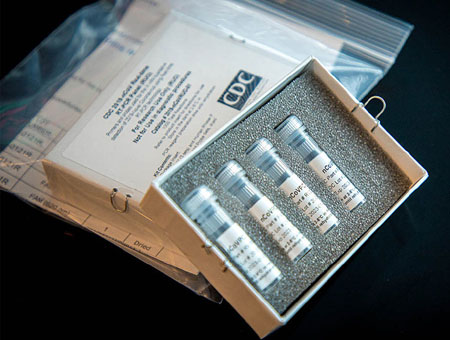by WorldTribune Staff, April 3, 2020
Between January and March, when testing for coronavirus on a large-scale could have made a huge difference in the fight against the virus, the Centers for Disease Control and Prevention (CDC) and the testing system failed in getting test kits to the public, said Dr. Anthony Fauci, a close adviser to President Donald Trump in combating the COVID-19 pandemic.

The Trump administration found that it not only inherited an inept CDC, but a highly political one as well, Rowan Scarborough noted in an April 2 analysis for The Washington Times.
“The federal watchdog for the department that includes the Centers for Disease Control and Prevention has issued a total of four press statements on its website in 2019-20, and three of them dealt with the health care of migrant children at the border,” Scarborough noted.
“The system, the system does not, is not really geared to what we need right now, what you are asking for. That is a failing,” Fauci, director of the National Institute of Allergy and Infectious Diseases, told the House Oversight Committee on March 11.
He later said the failure fell on the CDC, not the White House.
“The idea of anybody getting it easily the way people in other countries are doing it, we are not set up for that,” Dr. Fauci said. “Do I think we should be? Yes, but we are not.”
Trump in his daily briefings on the outbreak has explained that he inherited an antiquated system for producing and distributing test kits, protective gear and life-sustaining ventilators.
“It was broken,” Trump said Wednesday. “It was all broken.”
He says his administration now is modernizing the process. Today, more than 1 million coronavirus tests have been completed in the U.S., by far the world’s most.
CDC Director Robert R. Redfield acknowledged the failure, telling the Oversight Committee that his agency placed 75,000 test systems in various public laboratories that are not equipped to process a large number of samples. In a furious hunt for more kits, the administration changed course and turned to commercial firms, including LabCorp and Quest Diagnostics, which do 90 percent of such work.
At a previous House hearing, Dr. Redfield told of an inadequate system: “These public health labs need redundancy. They don’t have it. This is when I go back about the core capability of data, lab, people … The truth is we’ve not invested, we’ve under-invested in the public health labs … There’s not enough people. There’s not enough internal capacity. There’s no surge capacity.”
The Washington Times reviewed reports over the years by the Office of Inspector General for the Department of Health and Human Services (HHS).
The Times’ review found no comprehensive analysis of how the CDC performed in fighting previous epidemics, such as the 2009 swine flu. A spokeswoman for the inspector general told The Times that the office over the years has chosen to break out specific disease responses for study instead of a “granddaddy of all reports.”
The Times didn’t find any reports highlighting or warning of any inventory shortfalls in the National Strategic Stockpile. The stockpile is an $8 billion stash of medicine, medical equipment and other materials positioned around the country and maintained by the CDC until October 2018, when control shifted to an assistant secretary at HHS.
For the coronavirus, “the inspector general’s office is breaking with tradition,” Scarborough noted. It announced on Feb. 28 on Twitter, “We will conduct a comprehensive review of @HHSGov’s #coronavirus response efforts.”
The Times looked at recent inspector general statements posted on its web pages. There were seven in 2018-19 and one this year.
The first release for 2018 was “Diversity, Inclusion Enrich the Workplace.” Two of three releases in 2019 dealt with migrant children, as did the only 2020 release to date.
There were seven news releases in 2017, including “Asian American and Pacific Islander Heritage Month” and “Diversity and Inclusion Fuels HHS Office of Inspector General’s Fraud-Fighting Success.”
Under the heading “Media Matters,” the IG office made seven posts in 2019, two of which dealt with migrant children. There were also reports on opioid abuse and elderly neglect.
HHS does not have a Senate-confirmed inspector general for the IG system’s largest office, which has a staff of 1,600. The office is headed by Christi Grimm, who in January became principal deputy inspector general, succeeding an acting IG who retired.
Ms. Grimm has outlined five inquiries and surveys her team is conducting or will conduct on COVID-19 issues. The topics include a “comprehensive” look at how HHS has responded, hospital responses and emergency preparedness for unaccompanied alien children.
Intelligence Brief __________ Replace The Media
